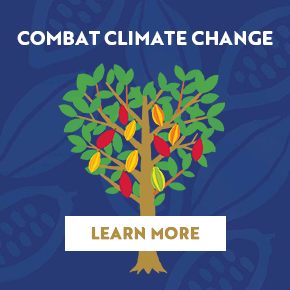In 2015, two representatives from Kuapa Kokoo Farmers Union (KKFU) visited the International Cocoa Quarantine Centre (ICQC), the research initiative based at the University of Reading in the UK.
Read on to learn more about the experiences of Mr. Appiah Kwarteng (cocoa farmer and former Secretary of KKFU) and Mr. Emmanuel Arthur (former Managing Director of Kuapa Kokoo Ltd.) as written by Suzanne Fogg. At the time, Suzanne served as the Senior Program Manager for Cocoa & Nuts at Twin Trading, one of Divine’s strongest partners and shareholders.
Ownership of Divine Chocolate has enabled Kuapa Kokoo to access many different aspects of the cocoa and chocolate industry that cocoa farmers generally know little about – including latest developments in farming, conservation and research.
Mr. Appiah Kwarteng (farmer and elected Secretary of the Kuapa Kokoo Farmers Union) and Mr. Emmanuel Arthur (MD of Kuapa Kokoo Ltd) were both in the UK for Divine Chocolate Board meetings, so arrangements were made for them both to take the opportunity to visit the ICQC while they were here.
I’m the Senior Program Manager for Cocoa & Nuts at Twin Trading, Divine’s co-owner and development partner, and I accompanied our colleagues from Kuapa to Reading. The first snow of the season had fallen overnight, so we had a picturesque journey past snow-covered rooftops and fields.
We were very kindly hosted by the ICQC director Dr. Andrew Daymond and colleague Michelle End of the Cocoa Research Association. Dr. Daymond runs the Centre at Reading, which up until 1985 was the responsibility of the Royal Botanic Gardens at Kew, where a new larger facility has now been established storing over 400 species of cocoa. We tend to hear about three varieties (Forastero, Criollo and Trinitario), so it was a surprise to hear of so many more known varieties.
Stepping out of the cold and into the warmth of the tropical glass house was quite different from visiting a Kuapa farmer’s cocoa farm.
Twin encourages farmers to adopt sustainable agricultural practices in which cocoa is intercropped with shade trees and food crops, but here were rows and rows of cocoa trees in large beach-ball sized pots being drip fed. The trees were pruned neatly--not for cocoa pods, but to provide plenty of bud sticks for cocoa research projects. This was to keep them small to stay within the confines of the glass house.
The main technique the Centre is pursuing is patch budding (a form of grafting) which involves taping a blight-free cutting to existing plants. These cuttings are sent all around the world to both major producing countries and smaller more recent producers like Vietnam and Australia.
Mr. Arthur and Mr. Kwarteng were of course particularly interested in how this research could impact cocoa growing in Ghana. The ICQC’s partner in Ghana is CRIG (Cocoa Research Institute of Ghana) which is already using ICQC samplings and crossing with local stock.
“It’s good to know there’s a place like this,” Mr. Arthur said. “We need to take this up seriously – buyers want to know how we are helping farmers to improve production and increase our volumes – they want to know we are a sustainable business.”
Michelle End agreed: “We’re getting the industry to support breeding,” she explained. “It’s the backbone of the industry – and the hope is that farmers will get new material, better than what they have now.”
Mr. Kwarteng, whose cocoa farm is in Anakum in the Manso-Amenfi District, Western Region, was keen to know how the program can improve Kuapa members’ yields and future sustainability.
“I am very pleased to see this research being done, and it would be interesting to see more of these species coming to Ghana,” he said. “It will be good if the results of this research are made available to us farmers. We hope that Kuapa can benefit,” he added.
We were told that research is currently ongoing to develop a clone particularly suited to Ghana – a program that will take about 15 years to get to roll out to farmers. In the meantime, supporting Kuapa farmers with training in sustainable agricultural practices such as soil and water conservation and shade management will be key to productivity increases and adapting to climate change.
Having the opportunity to talk directly to Kuapa representatives was interesting and useful for Dr. Daymond, too. “The visit provided a nice opportunity both to explain the work that we are doing at the University of Reading to Ghanaian cocoa farmers, but also to learn more about the projects that Kuapa Kokoo are involved in," he said after the visit.





